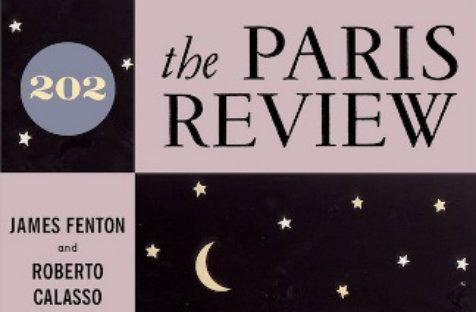This cosmopolitan collection of new poetry, fiction, collage and interviews is a fine survey of contemporary writing, taking both traditional and experimental forms.
The standout piece in this issue of The Paris Review is a stunning triptych of poems from well-established New York school poet Bernadette Mayer – part tribute to the symbolic legacy of Helen of Troy, part feminist critique of historiography and part autobiographical fragment.
In Helen Hypatia Bailey Bayly, Mayer leverages the multiple denotations of Troy (the ancient Greek city, the name of a city near the Hudson river in New York, a small town in Australia, the name of a cocktail) to weave what is at times a surreal, at times stark realist, tableau of Greek mythology, US industrial history and personal politics. She references the death of one of the few female mathematicians of ancient Alexandria, Hypatia and ties it in with her meeting of contemporary astronomer Helen Bailey.
The Helen Parsons Sestina is a luxuriant sequence dealing with the concepts of the archaic and egocentricity, underpinned by Mayer’s language poetry aesthetic. She creates multiple lexical sets with the dual-use of Paris, and shifts the narrative back and forth between several places of interest – Whitehall, Troy, Paris and NYC, each time adding new layers to the developing cycle of meaning. The reintroduction of earlier motifs from the first poem, their cobbling into new forms and deconstruction is reminiscent of Paul Muldoon’s longer sestina sequences. There is an interesting link with the Sestina portfolio of Daniel Handler and Maira Kalman, and George Seferis’ Helen, both of which are also featured in the journal.
Maroon, Muckle & Me continues the sestet structure, although not strictly adhering to the sestina, and develops the ideas from the first two poems, introducing new elements from Mayer’s childhood that build up the suite to a vivid climax. It is finely executed, with effective use of word play and repetition, and without an excess of ornamentation. The stream of consciousness is interrupted with well-selected line breaks and Mayer creates a real sense of unity through the cyclical use of key words with their rich connotations.
The editors have also included their own translations of ten poems by French surrealist trailblazer Guillame Apollinaire. I am not qualified to comment on the competency of the translations but the poems themselves are a shock to the system. They serve as a great introduction to Apollinaire’s oeuvre, ranging from florid lyricism to non sequiter mayhem, and right through to his typographically complex ‘concrete’ poems.
There are some truly haunting lines in this selection: ‘Memories / Are hunting horns whose sound dies in the breeze,’ from Cors De Chasse; ‘You watched the clouds roll in / Aboard the orphan steamer with fevers off the bow / With all of your regrets and your if onlys,’ from The Musician of Saint Merry and ‘Those shadows with their beards wept with a human sound,’ from Voyager.
The journal is renowned partly for its interviews, and this edition doesn’t disappoint, featuring an intriguing, sprawling discussion with writer and Adelphi publishing house tsar, Roberto Calasso. Calasso is one of those rare specimens who still have something of the Renaissance man about them, waxing eloquent about everything from Greek mythology to the Second World War and Italian fascism, philosophy, Indian and Taoist thought, classical music and the negative dialectics of Adorno, among many other subjects. What emerges is the silhouette of a thoroughly engaged and engaging mind, quick to pierce through the bubbles of populist literary criticism, and with a good measure of self-effacement too. His thoughts on the history of mythology and the plight of sacrifice in contemporary secular culture are a highlight.
This edition also features an interview with poet and academic, James Fenton, who rails against the postmodernist dogmas of contemporary American creative writing courses, citing the perverse homogeneity of their attempts to blow up ‘traditionalist’ poetics. There are also fascinating passages traversing his political journalism from South East Asia during the Vietnam War and about the Khmer Rouge. Fenton provides interesting asides on Auden, Marianne Moore and Robert Lowell, as well as the virtues of self-publishing. Included also is a selection of Fenton’s own poetry.
Sam Savage delivers a sardonic, highly self-conscious and stylistically diverse novella in his The Meininger Nude. He brings his penetrating, acerbic criticism of contemporary art cliques together with a more emotive strand that portrays the melancholia of an aging misanthrope who desperately fears losing control over the memories sustaining his forceful persona. Alongside these we get a vivid portrait of the artist, Meininger, as young man, aflame with ambition and constantly surrounded by his troupe of mediocre clingers-on. There is also the study of a father and son relationship in tatters, which comes into view as the family begins squabbling over what is to be done with the novella’s titular painting.
August Kleinzahler has produced a colourful, ecstatic portrait of the American ‘prairie troubadour’ Vachel Lindsay in his poem, The Rapture of Vachel Lindsay. Jason Zuzga’s poem Liquid Courage draws inspiration from the surrealist tradition and contemporary postmodern concerns with mass media simulacra. David Gordon’s Man Boob Summer is the tale of a creative, middle-aged drifter living with his parents who seduces a young pool lifeguard with his ruminations on Hart Crane. Sexual fixation and the push-pull of erotic disgust is the undercurrent in Ottessa Moshfegh’s Disgust, set largely in a Chinese internet café. There are also short fiction contributions from Jim Gavin and Peter Orner, and visual poetry/typographical collage by the artist Jess from the forthcoming book Paste-Ups.
Rating: 4.5 out of 5.
The Paris Review #202
Editor: Lorin Stein
Paperback (Demy format), 260pp, RRP $24.99
ISBN: 9780857867599
Allen & Unwin / Canongate





